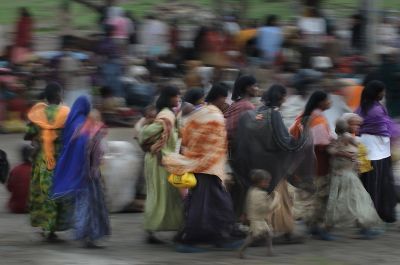Climate change already driving migration: IOM

Your support helps us to tell the story
From reproductive rights to climate change to Big Tech, The Independent is on the ground when the story is developing. Whether it's investigating the financials of Elon Musk's pro-Trump PAC or producing our latest documentary, 'The A Word', which shines a light on the American women fighting for reproductive rights, we know how important it is to parse out the facts from the messaging.
At such a critical moment in US history, we need reporters on the ground. Your donation allows us to keep sending journalists to speak to both sides of the story.
The Independent is trusted by Americans across the entire political spectrum. And unlike many other quality news outlets, we choose not to lock Americans out of our reporting and analysis with paywalls. We believe quality journalism should be available to everyone, paid for by those who can afford it.
Your support makes all the difference.Climate change is already forcing people to migrate, with most moving within their countries or to a neighbouring country, a report by the International Organization for Migration said Tuesday.
While the report did not give any estimates on numbers of climate change migrants, it warned that poor countries will need international support to help them cope with the growing trend.
The study "finds that large-scale human movement from climate change and environmental degradation is not only inevitable but is already happening."
"However, much of it is internal or cross border migration, belying some fears that millions of poor people will go to rich countries as a result of climate change," added the report entitled "Migration, Environment and Climate Change: Assessing the Evidence."
In Ethiopia, Mali, Burkina Faso and Senegal, there has been "fairly common" movements of populations in response to drought, said the report.
The report also zeroed in on Senegal's Tambacounda region, where drought-related migration began as a local form of internal migration, but later moved to other neighbouring African states.
While the number of people affected by natural disasters has more than doubled in recent years, there has been no corresponding rise in long-distance international migration from disaster-affected regions during these periods, it said.
But with more people and regions expected to be affected by global warming in coming years, the report warned that international support would be needed to help poorer countries cope with the movements.
It also noted that there was a "worrying lack of policies" in richer destination countries to deal with environmental migration.
"While acknowledging that the impact of climate change on migration is predominantly internal movement, international migration is nevertheless likely to be increasingly important in the future and will necessitate policy and programme responses that are currently lacking," it added.
The UN refugee agency has estimated that some 24 million people worldwide have fled their homes due to environmental factors.
The IOM report noted that wide-ranging estimates of climate migrants - from the lower figure given by the office of the UN High Commissioner of Refugees to another of 1.0 billion people by 2050, also highlights the "dearth of serious data research" on the issue.
Join our commenting forum
Join thought-provoking conversations, follow other Independent readers and see their replies
Comments